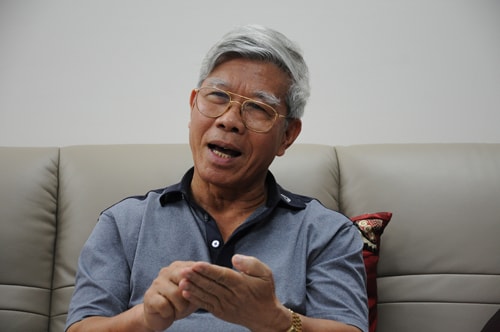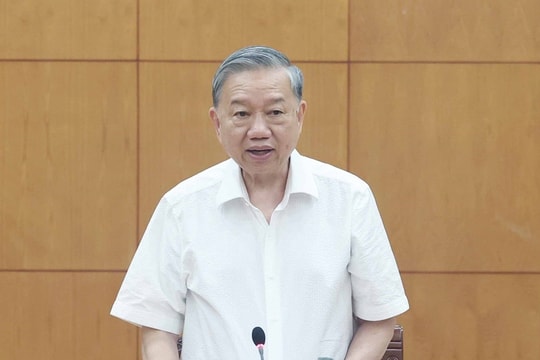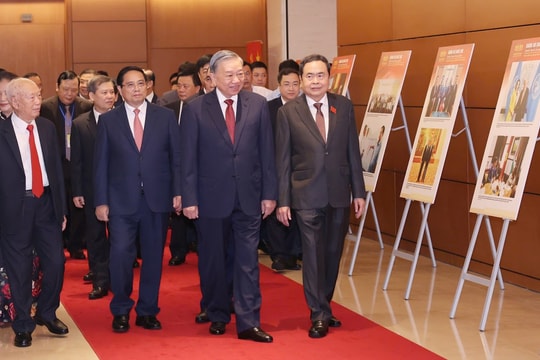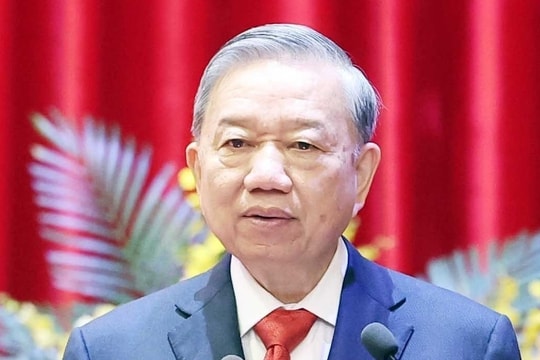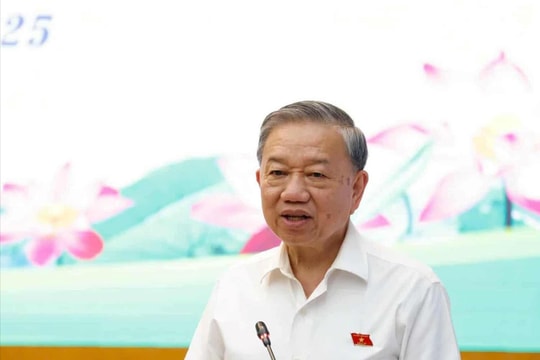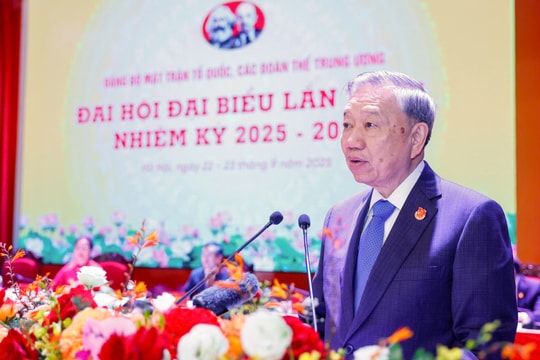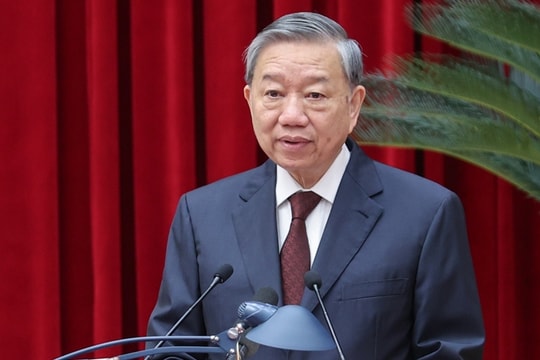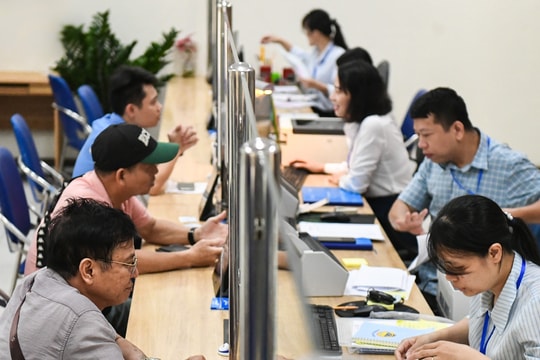Former General Secretary Do Muoi and the fight against 700% inflation after Doi Moi
Mr. Le Duc Thuy, a long-time assistant to former General Secretary Do Muoi, shared his memories of him, including the fight against inflation before 1990.
As an assistant to former General Secretary Do Muoi for many consecutive years, Mr. Le Duc Thuy - former Governor of the State Bank shared withVnExpressmy greatest impressions of the late General Secretary.
- From a person specializing in research, how did you become the secretary and close assistant of the late General Secretary Do Muoi?
- In 1988, when I was Deputy Director of the Institute of Economics, I suddenly received an invitation from the Central Office to go on a business trip with Chairman of the Council of Ministers Do Muoi for a month.
|
Mr. Le Duc Thuy, former Governor of the State Bank: Photo:VT. |
Later, I learned that when he first became Chairman of the Council of Ministers, he told Mr. Le Xuan Tung (at that time, assistant to General Secretary Nguyen Van Linh), "Do you know anyone who understands economics to find someone for me? If you can find someone from your hometown, that would be great, because I like people from your hometown to speak frankly."
Mr. Le Xuan Tung introduced me. The reason was that when Mr. Tung was working at Nguyen Ai Quoc School, I went there to do my research. During my studies, he observed me and thought that I was a sharp person, so he wanted to keep me at the school, but I decided to return to the Institute of Economics. After that, Nguyen Ai Quoc School arranged for me to go to the Soviet Union to continue my research.
Returning from the Soviet Union, I thought I would be involved in research for the rest of my life. Honestly, at that time, I just wanted to do science and be at ease. But when I expressed my wish to work at the Institute of Economics, Mr. Do Muoi said: "It's up to you. But if I let you sit in a place where you can fully, directly and deeply understand the economic issues of the country that need to be handled to advise and make recommendations, and you refuse, I don't understand how you do scientific research."
His words made me think a lot and I realized that if I did not accept to help him, it would be a shame. Therefore, despite the difficulties in my personal life, I still encouraged my wife to support me in working as his secretary.
I still remember the first day I went to see Mr. Do Muoi. When I entered the room, I saw an old man wearing a blue uniform and asked me, "Are you here to help me?" I replied, "Yes, sir."
At that time, I had no idea that my “business trip” with him was not just a month but many years later. During my business trip to the South, the Office arranged for me to stay in the villa with the Chairman of the Council of Ministers, my room and his room were almost opposite each other. He usually went to bed early, around 10am. We were later, but every morning, I woke up and looked over to his room and saw that the light was already on. Later, I learned that he often got up to work at 3am and he still “complained” about me for sleeping too much.
- What was your biggest impression during your time assisting the late General Secretary?
- When Mr. Do Muoi became Chairman of the Council of Ministers, the term of the 6th Congress had not been over for two years, and there was not much time to implement the Doi Moi policy into life. The Government was struggling to make ends meet with hundreds of thousands of tasks inside and outside. Therefore, I think that Mr. Do Muoi, as head of the Government and then head of the Party, was one of the key leaders who successfully organized the implementation of the Doi Moi policy of the 6th Congress; bringing the Doi Moi policy into life in a comprehensive way through the Government's executive activities.
In the years after the renovation, Vietnam began to advocate promoting the strength of economic sectors nationwide, including encouraging the private economy. From the reality of "breaking the fence" in this place and that place, as Prime Minister, Mr. Do Muoi and the Government had to turn those signals of local renovation into common work for the whole country to do together.
Many people asked me about Mr. Do Muoi being the Head of the Department of Reforming Capitalist Industry and Commerce in the South after 1975; and when he was Chairman of the Council of Ministers, he directed and operated to "promote the strength of economic sectors?". I also heard public opinion about him like that. But once in a private conversation with me, he said that when carrying out the tasks of socialist reform, he tried to implement the organization's direction with the common understanding that socialism only has public ownership, only state-owned and collective economy. "At that time, in the policies, guidelines as well as research projects in Vietnam and other socialist brother countries, there was no official opinion that went against that. Maybe the handling of specific issues was not correct and I was responsible. But I think I cannot do otherwise than the general decisions. Now, with Doi Moi, it is pointed out that the old way of doing things is not suitable, so it must be corrected."
To me, former General Secretary Do Muoi was a person who was always serious about his work throughout his life, from wartime to peacetime tasks. Whenever the organization assigned a task, he always worked hard to complete it and never thought about not doing it or doing it halfway.
I remember in 1988, a famous economist asked to meet Mr. Do Muoi to discuss the country's problems. When he stood up to leave, he angrily told the Chairman of the Council of Ministers that "if we continue to apply the multi-sector economic policy, sooner or later we will have to do another socialist transformation; and I dare you to fight inflation". This was almost a challenge to the Government leader at that time.
Until now, time has answered how the Government under Mr. Do Muoi successfully fought inflation. But I still tell this story to say that there was a period, not only before the 1986 Renovation but also in the years after, in many levels and many circles in Vietnam, there was still a heavy emphasis on thinking and doctrine like that of the famous economist mentioned above.
During his first Tet as Chairman of the Council of Ministers, Mr. Do Muoi went to the South for work and met with private enterprises. For the first time, the head of the Government wished everyone a prosperous business. Public opinion at that time felt a real innovation in him.
"Budget revenue is used for spending"
- You just mentioned the challenge of former Chairman of the Council of Ministers Do Muoi in the fight against inflation. How did this happen?
- Those were the years when Vietnam transitioned to market prices, abolished subsidies, and abolished ration cards. After 1986, it was not like Vietnamese people woke up and the subsidies were gone. At that time, food rations were still in place, and river and market blockades were still in place.
And not only struggling domestically, Vietnam also had to calculate how to open up to do business with the outside world. In 1987, the Government had a policy of attracting foreign investment in the context of the US embargo and our country had not yet normalized relations with China; the Soviet Union and Eastern Europe were gradually collapsing. In that context, the Government had to work day and night, thinking of strategies to implement the Renovation policy. It was not easy for Vietnam to get out of the economic crisis.
In 1987, inflation rose to nearly 700%, and by 1988 it had decreased but was still at a terrible level of 300%. In January and February 1989, inflation increased by 8% each month. Once on the plane from the South, Mr. Do Muoi told me, "With inflation like that, no one can do business. You put aside all other work and focus on fighting inflation for me."
I understood that the direction of the Chairman of the Council of Ministers was to mobilize maximum force to fight inflation, so I quickly deployed the connection of necessary contacts. At that time, the Government summoned ministries, branches, research institutes... and asked each unit to make an anti-inflation project, to present directly to Mr. Do Muoi.
After many rounds of listening to reports, he selected 4 projects with new ideas from the Institute of World Economics, National Economics University, Faculty of Economic Management of Ho Chi Minh National Academy of Politics and Central Economic Committee. From these 4 projects, he asked to distill to put the most outstanding points into a project. We found about 10 people to form a group to write an anti-inflation project.
|
Former General Secretary Do Muoi. Photo:Reuters. |
In the fight against inflation in 1989, because of the lack of goods, we thought we had to produce more goods without realizing that the real interest rate should be positive, meaning higher than the inflation rate so that people would still want to deposit money in banks. At that time, Vietnam still maintained subsidies in bank credit, kept the level of capital mobilization from the people at low interest rates so that people did not deposit money. This led to the situation of "if banks do not have money to lend, they print more money to lend, if the budget does not collect, they print more money to spend". And inflation thus became an unstoppable spiral.
The anti-inflation plan put on the table of the Chairman of the Council of Ministers had many contents, the key of which was to introduce a positive real interest rate. This measure surprised many people now, but at that time it was necessary. The deposit interest rate was raised from only 2-3% to 9% per month for non-term deposits and 12% for 3-month deposits. Obviously, when inflation was 8% per month, the interest rate of 9% was not high.
The idea of positive real interest rates came to Mr. Do Muoi and was transformed into his directives very simply. That is, “the price of goods and the price of money (i.e., interest rates and prices of goods) must be like a boat and water. When the water rises, the boat rises; when the water falls, the boat falls; one cannot be left in the sky and the other on the ground.” The Chairman of the Council of Ministers was determined to implement this policy.
Along with a number of other measures, the implementation of the project helped reduce inflation in 1989 to about 35-40%, while the project was expected to be achieved by 1990. But the price to pay was also very high. Because before that, the currency depreciated rapidly, people who received their salaries had to buy things immediately to keep the goods instead of keeping money. Each family became a warehouse to store goods. Rice had to be left over for several months, bicycle tires had to be several pairs..., otherwise, if the money depreciated by 8% each month, the salary would be considered gone. The people's warehouses were bottomless, so no matter how much goods there were, there was always a shortage. When the interest rate was raised, people found it more profitable to deposit money in the bank and stopped buying goods. So there was a surplus of goods. State-owned enterprises at that time accounted for a large proportion of the national economy (about more than 90%), many types of goods such as soap, cigarettes... that were not enough to make in the past were now unsold, workers had to push carts to the alleys in Hanoi to sell. This situation leads to unemployment, many people have to retire at once.
In a short time, a series of factories closed, about 600,000 workers lost their jobs. The price to pay for fighting inflation was so high that it was pushed to the Central Government. In a high-level meeting, there was an opinion that "Vietnam cannot have such low inflation, it must be at least 5% per month. Now the annual inflation is only 35%, but goods cannot be sold, workers are unemployed, many social problems arise". The internal friction at that time was very fierce.
But Mr. Do Muoi and many other leaders continued to implement anti-inflation solutions according to the plan, although with some adjustments in level.
Mr. Do Muoi was determined that “banks borrow to lend, the budget collects to spend”. I remember that simple but principled saying very well. Until now, not everyone understands and does it correctly. Thanks to this determination, by 1992 inflation was controlled to more than 10% and gradually decreased after that.
Also in 1989, Vietnam planned to import 200,000 tons of food to feed the whole country, but the result was that instead of importing, there was still a surplus for export when it had a reserve of 500,000 tons and the foreign currency could be enough to import another 500,000 tons when needed. This was a miraculous comeback for a country that was starving to become a rice exporter.
|
General Secretary Do Muoi (center) at the 1996 conference to exchange experiences in joint ventures with foreign countries.Photo archive. |
Allow assistants to study in the US
- It is known that you were the first Party and State leader's assistant to study abroad for a year at Harvard in the context of Vietnam - US relations not yet normalized. How did the story unfold?
- In the early 1990s, Vietnam built a 10-year socio-economic development strategy (1991-2000). Mr. Do Muoi presided over this project as Chairman of the Council of Ministers, while the Ministry of Planning and Investment was directly compiled by Mr. Phan Van Khai as Minister.
The way to build the project is the same as before, he mobilized the intelligence of many agencies and individuals, and finally grouped them into an editorial team. This time, in particular, the Chairman of the Council of Ministers agreed to invite a group of professors from Harvard University to participate in giving opinions, listening to issues on market economy, promoting exports, domestic production of strong products to replace imports... Interest rates and exchange rates were gradually adjusted according to market signals.
After 10 years of strategy making, Harvard professors asked Mr. Phan Van Khai to create conditions for me to study in the US. Mr. Khai wrote a letter to Mr. Do Muoi. I personally wanted to go too. But I didn’t expect it to be so difficult for me to study. When I explained, Mr. Do Muoi asked, “How many years will you be going?” I said, “At least one year, and preferably two years.” He said, “I will let you go for one year and then you can come back.”
When I was completing the procedures to go to school, the competent authorities expressed concern that my position at work could be exploited when I went to the US. The US was embargoed against Vietnam. But Mr. Do Muoi wrote in the document that, “Mr. Thuy does not do anything related to security and defense, so he can go to school.”
In my life, I had the honor of assisting the late General Secretary Do Muoi, with many unforgettable memories. Among them, I was impressed by him not only as a practical person, a good listener, and a person who gathered wisdom, but also, while busy with his leadership and management work, he always took the time to do his own research. He read a lot of documents both at home and abroad. Whenever he had free time, he took the opportunity to read.
Books were the most precious gift to him. In 1988, the National Economics University translated the economics textbook of Yale University, USA and gave him a copy. Later, I saw him read it very carefully, underlining the important points, discussing some issues in the book that even I did not understand...
Once when I stopped being General Secretary, I visited him. He showed me the book "Currency War" and asked, "Have you read this book?"
Perhaps among the leaders I know, he is the one who reads the most, learns the most and therefore has changed a lot in his thinking. In particular, he always sticks to reality and uses reality to illuminate the principles of books, adjusting them accordingly.
In the world as well as in Vietnam, not every opinion of a leader is correct or new; not every practical decision of a leader has no limitations. But, to me, the devotion of leader Do Muoi to the country and listening to the opinions of experts, comrades and colleagues helped him to do his job excellently and now he passed away peacefully.
Former General Secretary Do Muoi passed away at 11:12 p.m. on October 1 at the 108 Central Military Hospital at the age of 101. His real name was Nguyen Duy Cong, born on February 2, 1917, in Dong My commune, Thanh Tri district, Hanoi.
The former General Secretary was tempered through the resistance wars to save the country and the stages of building, developing the socio-economy, and defending the Fatherland.
In September 1960, at the 3rd National Congress of the Vietnam Workers' Party, Mr. Do Muoi was elected as a member of the Party Central Committee.
In December 1986, at the 6th Party Congress, he was elected to the Central Executive Committee, member of the Politburo and Standing member of the Secretariat. Two years later, the National Assembly elected him Chairman of the Council of Ministers.
At the 7th and 8th Party Congresses, Mr. Do Muoi was elected to the Central Executive Committee, member of the Politburo, and held the position of General Secretary of the Central Executive Committee of the Party (June 1991 - December 1997).
He was a National Assembly delegate of the II, IV, V, VI, VII, VIII, IX terms and was awarded the 80-year Party membership badge.

